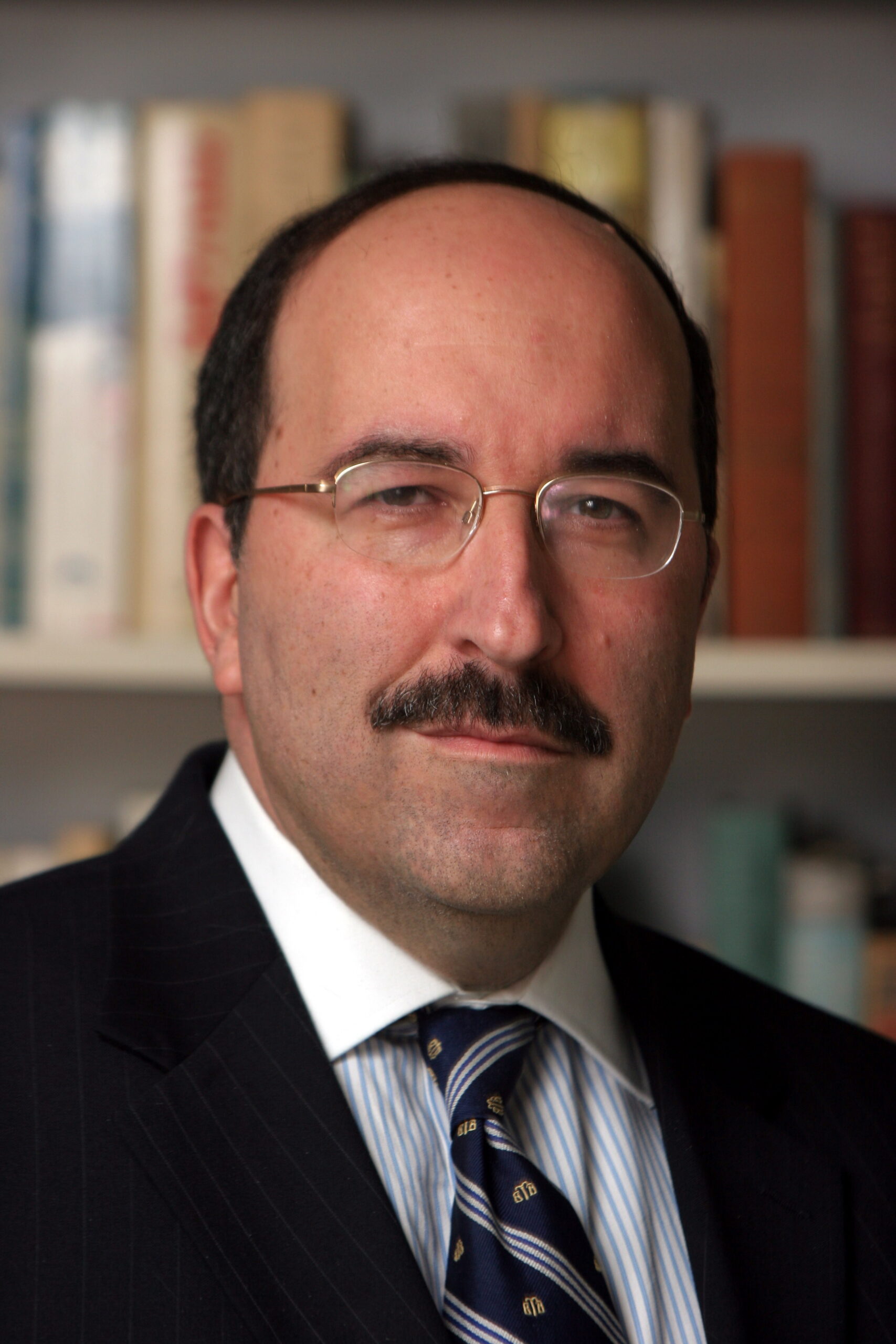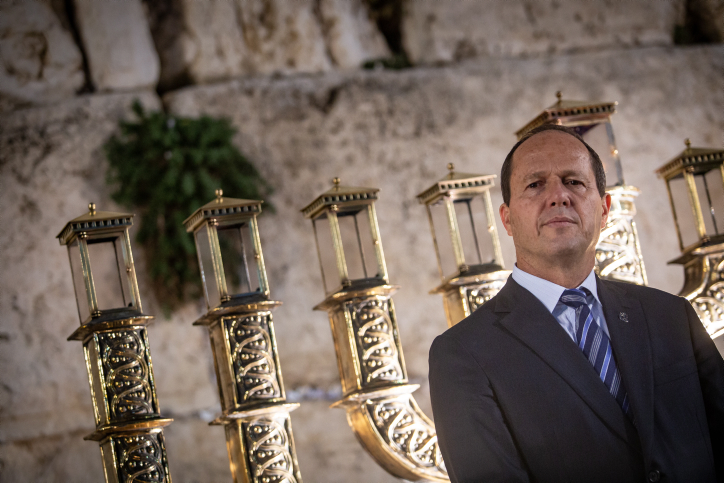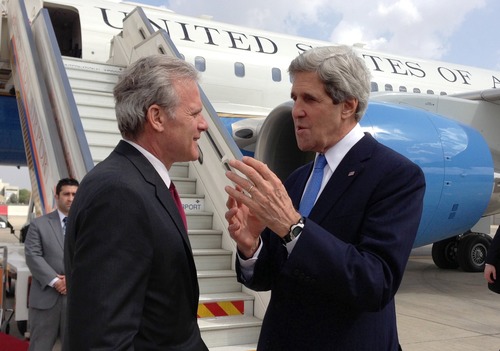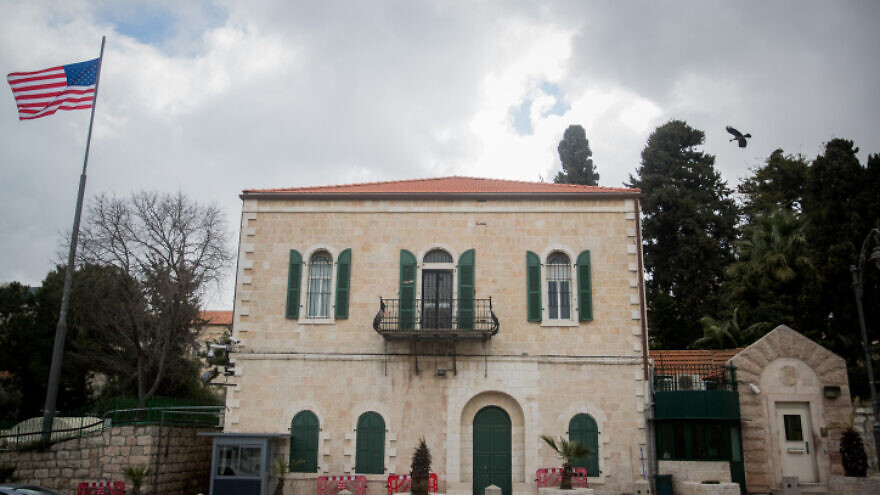Former Foreign Ministry director-general Dore Gold, currently the president of the Jerusalem Center for Public Affairs, believes that Israel should put things on the table and clarify to the United States very openly what it can and can’t do.
“If we are very clear about our real maneuvering space, the Americans will respect that,” he stated.
Gold, who is well known for his cautious phrasing, does not mince his words on the consulate issue, defining the administration’s intention to reopen the consulate in Jerusalem as “scandalous.”
“Israel cannot come to terms with threats to its sovereignty in Jerusalem,” he said.

Longtime Israeli diplomat Dore Gold, currently president of the Jerusalem Center for Public Affairs. Credit: Wikimedia Commons.
Q: Is it possible to prevent the Americans from going ahead if they plan to act unilaterally, as has already been hinted?
A: Perhaps not, but then we will have to hold in-depth discussions regarding the possibility of an Israeli response; for example, the expansion of Jerusalem’s boundaries. There are other ideas, I don’t want to expand on them here. But, of course, we certainly can’t put won’t be able to leave such measures without a response.”
Q: The United States claims that the consulate existed for decades without Israel making any request for it to be closed.
A: We judge the existing reality. The Palestinian Authority didn’t exist for decades, and now it does. For 19 years, Jerusalem was divided with fences and a border, but for 54 years, it has been an undivided city. Things change. If they had opened a consulate in Ramallah, I wouldn’t have been enthusiastic, but I would have understood it. If they had opened a consulate after the Palestinian authorities stopped paying salaries to the families of terrorists, I still wouldn’t have accepted a consulate in Jerusalem, but I would have understood the demand. But the Palestinians haven’t changed their behavior and they are receiving a reward.
Q: Is the opening of an American consulate for the Palestinians in the capital a move that annuls American recognition of Jerusalem as Israel’s capital?
A: It could lead there, or it could pave the way. One has to remember that there is the Vienna Convention of 1963, which both Israel and the United States are signatories to, and according to which the agreement of the host state is required to open a consulate. To do so unilaterally without Israel’s agreement would be breaking the rules.
Q: Perhaps the fight against the consulate, which at the end of the day is a symbol, is the wrong battle? Perhaps it would be better to focus on construction in Atarot, Har Homa, Givat Hamatos and E1, which could shape the boundaries of the city for generations to come?
A: There is no contradiction between the two. I in any event don’t see the United States today allowing a policy that recognizes Israel’s rights to build on territories that were part of Jordan before 1967. Coordination with the United States is something that is vital and important, but the story of the consulate is critical, and there is no room for compromise on this issue. It is something that is at the very soul of the state. We cannot compromise on our rights in all of Jerusalem.
Gold noted that he explained these rights in 2017 in great detail to the House of Representatives.
“Our friends there understood it,” he said, adding, “The formal reality now is still such that from the perspective of the United States, Jerusalem is the capital of Israel. The United States has not withdrawn recognition of this. In this reality, we must be tenacious and manage this battle with the U.S. with prudence and sensitivity. But most of all, with tenacity and faith.”
Gold clarifies that he himself does not differentiate between the east and the west of the city.
“There is one Jerusalem, but the opening of the consulate on Agron Road in the west of the city will not only undermine Israeli sovereignty in the capital, it will also result in a grave withdrawal from the status Israel achieved in West Jerusalem prior to 1967.”
Compromise and creative solutions
Oren is also convinced that if the administration reopens the consulate unilaterally, Israel will have to fight the move.
“Theoretically, one could stop providing electricity and water to the building. And it is possible to do other things that we shouldn’t talk about right now,” he said. “One has to take into account that there will be a price to pay; perhaps condemnations and perhaps sanctions. Therefore, we have to weigh carefully whether we can bear those costs. It is a strategic question, but, if, God forbid, the Americans decide to break all the rules, the battle at one level or the other will have to continue.”
Oren hints at creative solutions that are being spoken about behind the scenes but refrains from providing any details.
“We have to stand up for our interests,” said Oren. “I can see [a] crawl toward that old anti-Semitic policy whereby the ambassador in Washington is summoned for every demolition of illegal construction in east Jerusalem, and … for every brick that is laid in Jewish neighborhoods in Jerusalem beyond the Green Line. It is a matter of sovereignty and national honor. This is our capital. We must set boundaries, even when we are talking about our greatest friend. This is the moment where I would expect from our government to do so clearly, firmly and respectfully,” he added.
The campaign against the opening of the consulate has been headed for several months by Likud Knesset member and former Jerusalem mayor Nir Barkat, who said he is in possession of polls that show “a huge majority among the Jewish public that is against the moves planned by the United States … even most Yesh Atid [Party] supporters are against this.”
“When the State of Israel was established,” he noted, “it inherited the consulates that operated in Mandatory Palestine prior to the establishment of the state. It allowed [them] to continue to operate, but it also made sure not to [allow] the opening of a new consulate in Jerusalem.”

Then-Jerusalem Mayor Nir Barkat attends a Hanukkah event at the Western Wall in Jerusalem on Dec. 3, 2018. Photo by Aharon Krohn/Flash90.
“Having two diplomatic delegations in one city means the division of Jerusalem. There is no other possible meaning. It is a finger in Israel’s eye,” said Barkat.
“If the Americans take such a unilateral measure, it will not only be a violation of the Vienna Convention, but also an American message that the great United States is not capable of respecting its most loyal partners. It is liable to have a very strong effect on relations with the Americans,” he said.
Barkat, too, refused to be drawn in with regard to possible Israeli responses to such a unilateral move by the Americans.
“In my opinion, we must not go there,” he said. He expressed the hope that both the “opposition and coalition should unite around my proposed legislation that prohibits the state from opening or establishing in Jerusalem a diplomatic representation that serves any foreign entity.”
Barkat warned of a possible chain reaction that could be set off unless this happens.
“There are no words to describe the size of the catastrophe if we do not act to prevent this. As soon as the United States unilaterally opens a consulate for the Palestinians, other countries could take similar measures, and then we will have lost the ability to stop such a process in the future.”
In the meantime, the American administration is preparing the ground for the move, and has even allocated a budget to operate the consulate. It has also begun looking into opening a branch of the consulate in the east of the city. An American source clarified that opening the consulate “is an election promise made by Biden. He owes it to large parts of the Democratic Party.”
In Israel, on the other hand, a source inside the coalition warned the Americans that insisting on the reopening of the consulate, even after the budget passes, will undermine the Bennett-Lapid government and could serve opposition leader Benjamin Netanyahu.
“There are ministers in the government who will be unable to live with this and may switch their support to the opposition,” said the source. “I hope and believe that the Americans are taking this into account as well,” he added.
This is an edited version of an article that first appeared in Israel Hayom.





























